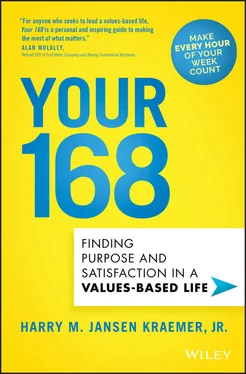My four siblings—Steve, Paul, Marilyn, and Tom—always remind me that we should not focus on work-life balance but life balance.
I am deeply indebted to my students in the full-time, part-time, and executive MBA programs at Northwestern University's Kellogg School of Management. They are a continual source of reflection and challenge for what it means to pursue a values-based life.
I would also like to thank the following people for sharing their wisdom and personal experiences regarding pursuing a values-based life: Khalid Ali, global marketing director, Dow Chemical; Rob Apatoff, executive director, Kellogg School of Management; Anna Budnik, managing director, Willis Towers Watson; Carter Cast, clinical professor, Northwestern University Kellogg School of Management; J. P. Gallagher, president and CEO, NorthShore University HealthSystem; Fred Harburg, founding partner, AJIL Analytics; Karen May, retired EVP, Mondelez; Dr. Daven Morrison, founding partner, AJIL Analytics; Kevin Murnane, clinical professor, Kellogg School of Management; Jeffrey Solomon, chairman and CEO, Cowen Inc.; Kent Thiry, chairman, DaVita; and Mike Zafirovski, CEO, Zaf Group.
I would like to thank the great work of my publisher, Wiley, especially Jeanenne Ray, Georgette Beatty, and Susan Geraghty, and Andrew Furgal of ImagePros Inc. for the graphics.
Also, a big thank-you to my colleagues, students, and friends who took the time and gave me excellent suggestions and feedback on early drafts of the book, including Khalid Ali, Dan Braga, Jamie McLaughlin, and Ben Zastawny.
Finally, and most important, a very special thanks to Tricia Crisafulli, who has been my trusted collaborator and colleague on all three of my books. For this book, I was also fortunate to work with her son, Patrick Commins, as a key contributor. Without them, this book would not have been possible. Thank you, Tricia and Pat!
—Harry M. Jansen Kraemer Jr.
Wilmette, Illinois
Harry M. Jansen Kraemer Jr.is a professor of management and strategy at Northwestern University's Kellogg School of Management, where he teaches in the MBA and the Executive MBA programs. He is an executive partner with Madison Dearborn Partners, one of the largest private equity firms in the United States, where he consults with CEOs and senior executives, and he serves on several for-profit and nonprofit boards. Kraemer is the former chairman and chief executive officer of Baxter International Inc., a multibillion-dollar global health care company. He has been voted Kellogg Professor of the Year in both the full-time MBA and executive MBA programs, including on the Miami and Hong Kong campuses.
INTRODUCTION: THE MOST IMPORTANT NUMBER
Most of us have at least a general idea of what we think our lives should look like: the kind of work we do, the quality of our personal relationships, our health and self-care, what we do for fun, what role faith and spirituality play in our lives, and the impact we want to make on our community or even on a global scale. We may want all these things, some of these things, or only a few. It's not about following a formula or a prescription—rather it's about your values being expressed in the way you live .
The challenge, however, is that certain aspects or components of our lives can overshadow the rest. In some cases, they consume so much of our time, energy, and attention that there is not much time left for the other areas we say are important to us. Maybe our work takes almost all our time because we have convinced ourselves that we should be in constant motion. Maybe we focus so much on a leisure activity or sport that it eats away at the time we say we want to spend with other people—family, friends, and loved ones. Or maybe we don't make our health enough of a priority in terms of time commitment. In other words, there's cognitive dissonance: we say certain things are important to us, but our actions don't match those words. There is a disconnect, and not just for a few days or over the course of a busy week or two. I'm talking about chronic imbalance—that feeling of being constantly short of time and attention, always rushing to get things done, and ending each day exhausted and overwhelmed.
Without question, we're very active, but are we being productive? Or are we moving so fast, we don't even know? And if we don't know, do we just keep moving because we've confused activity and productivity? As the pace of the world accelerates, and technology blurs the lines between work and home, balance can become an elusive goal. Some people think it's impossible. We start out with good intentions but find ourselves sidetracked, distracted, and even out of control.
To be clear, when I talk about balance, I don't mean work-life balance. If we think about it, that's a confusing concept. The way it is expressed—work-life—seems to indicate a choice that either you're working or you're living. For those of us who work a lot, let's hope work is part of living (if not, we've got a real problem!). We are not just switching from professional to personal, like flipping a switch.
Our lives are multifaceted. We are involved in our careers, but there's more to our lives than just work. We want our lives to have meaning, to lead what I call a values-based life in which what we do reflects who we are and what matters most to us. For many of us, that includes spending meaningful time with family, friends, and others in our community. We have outside interests and leisure activities that are important to us and help us feel more balanced. Maybe faith or spirituality is important—even at the center of our lives. Most people want to be healthy and pursue some kind of exercise. Just about everyone I talk to would like to get a little more sleep. And if we think about it, we know we're here in this life for a short period of time and would like to make a difference in our community—and maybe in the world.
These components aren't just lofty goals that sound good or items on a wish list. They reflect our values. By devoting meaningful time to their pursuit, we can lead a values-based life that enables us to be true to ourselves and what we say is most important.
Given how busy everyone is, this doesn't happen by accident. The only way to lead a values-based life is by becoming more self-aware of how and where we spend our time. And that's where your 168 comes in.
Like most math majors, I have a favorite number. Mine is 168. Often, when I ask my students to guess its significance, about one in ten figures it out. It's the number of hours in a week. No matter who you are, what you do for a living, where you live, or how productive you are, you only get 168 hours a week. The only difference is how you spend that time.
It's not about working x hours a week and then having the remaining hours for “other things.” It's not working or living, remember? To have true balance among different components of your life—the areas you say are the most important—you need to allocate your time just as you would any precious resource. You accomplish this by being self-reflective and accountable for how you spend your time.
Some people ask me why I don't use 24 hours to divide up a “typical day.” For most people (myself included), there is no such thing as a typical day. In my case, on any given day, I may be teaching at Northwestern University's Kellogg School of Management (my graduate school alma mater), traveling across the country to give a speech, working for Madison Dearborn Partners and our private equity portfolio companies, or attending not-for-profit board meetings. Or I could be involved in church activities, spending time with my family, or traveling for leisure. There's no “typical” day.
Читать дальше












